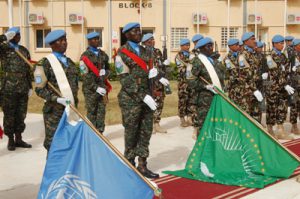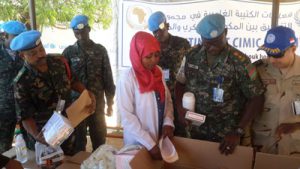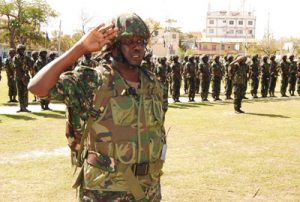PEACE SUPPORT OPERATION
A MORAL OBLIGATION FOR THE GAMBIA ARMED FORCES
To embark on Peace Support Operation (PSO) is a noble and humble task which stems from the moral obligation to assist countries in crisis situation. The focus of PSO is to prevent further deterioration of a conflict situation, while specialists in conflict resolution embark on the herculean task of trying to resolve the impasse.

Peace Support Operations therefore, are the combination of efforts by all stakeholders to find a common solution to a conflict. It often involves civilian staff, civil police and the military. It is often said that “Peacekeeping is not a job for soldiers, but only soldiers can do it. There is a path for those who plan to shape the future, for those who stand for freedom and those who lead the effort to defend it; such is the path of peacekeepers”.
The successful restoration of peace always comes with a price. In a situation where the mission mandate is to enforce peace authorized under Chapter VII of the United Nations, the consent of the parties does not really matter much. In such a case, resistance to the mission’s deployment is often very popular and considered by the opposing parties as patriotic and a defence of sovereignty. Skirmishes and fire fights become inevitable and in the process casualties are sustained lives are lost and serious injuries sustained. Neutrality and impartiality of peacekeepers is of paramount importance and to a large extent determine the mission’s future and credibility. Lack of neutrality has t

he potential to bring the image of the mission into disrepute and also poses a significant threat to the lives of peacekeepers. Parties to a conflict have a history of resorting to attacking peacekeeping personnel to draw the attention of the international community to their plights. This is also often the case where a party felt threatened by the presence of peacekeepers especially in cases where an indictment for war crimes and crimes against humanity is hanging over a party’s head. In such situations, harassment of peacekeepers and the fabrication of allegations to tarnish the image of the peace mission are often made in other to give the impression that the indictment was manipulative and politically motivated.
In peace support operations, it is not the number of casualties that matter; it is the mission’s mandate and objective. Peacekeepers are taught never to be intimidated even if they are harassed. Even if forced to apply live fire in defence, any force so applied should be proportionate. Peacekeepers should not be too emotional about things. Their priority is to win the hearts and minds of not only the civilians but also the belligerents. Adequate explanation of the mission’s mandate and its impartial execution is likely to convince genuine and reasonable fighters to renounce aggression and pursue the path of peace. After all, a stable society is in everyone’s interest. It is only a stable environment that guarantees economic growth and investment.
As attested to by Kofi Annan the former Secretary General of the United Nations, “History has taught us that our transformation into human beings evolved around conflicts and violence. The wars fought from ancient civilization to those of World War 1 and 2, to modern liber

ation wars fought both at national and international levels are all living testimonies to this reality. Those who fought in all such wars did so for the enduring modern freedom enjoyed across all free and peace loving societies of our times”.
From the trenches of Burma to the streets of Tripoli; to the sand storms of Darfur, the woodlands of Monrovia, and the mountainous region of Nepal, gallant men and women of the armed and security services of The Gambia have lost their lives leaving behind a historic antidote in the annals of global history. The sacrifices of those who died for the course of freedom epitomize the significance of peace.
The efforts and resources put in place by The Gambia Government, in terms of peacekeeping, clearly demonstrate the overall resolve of the government to fulfill our moral obligation of helping a neighbor in times of crisis.



